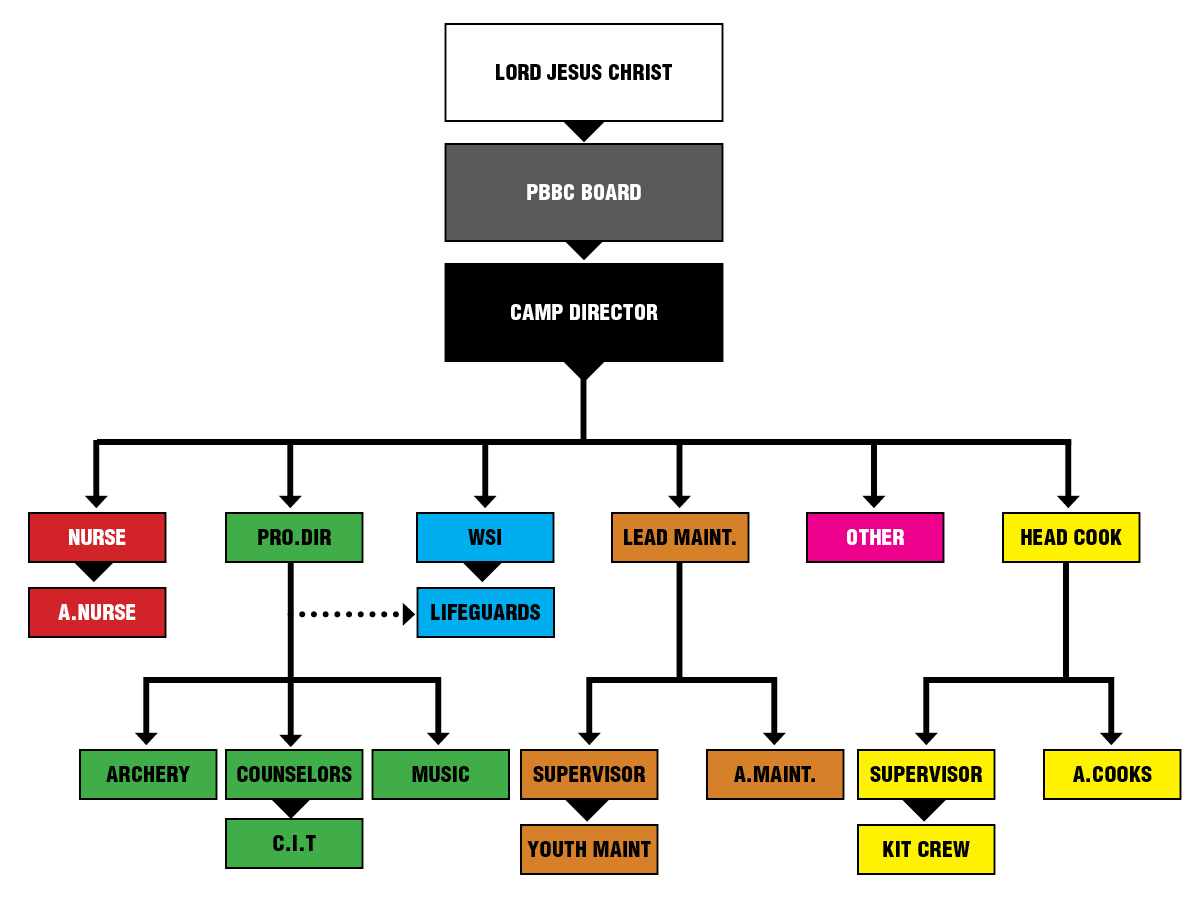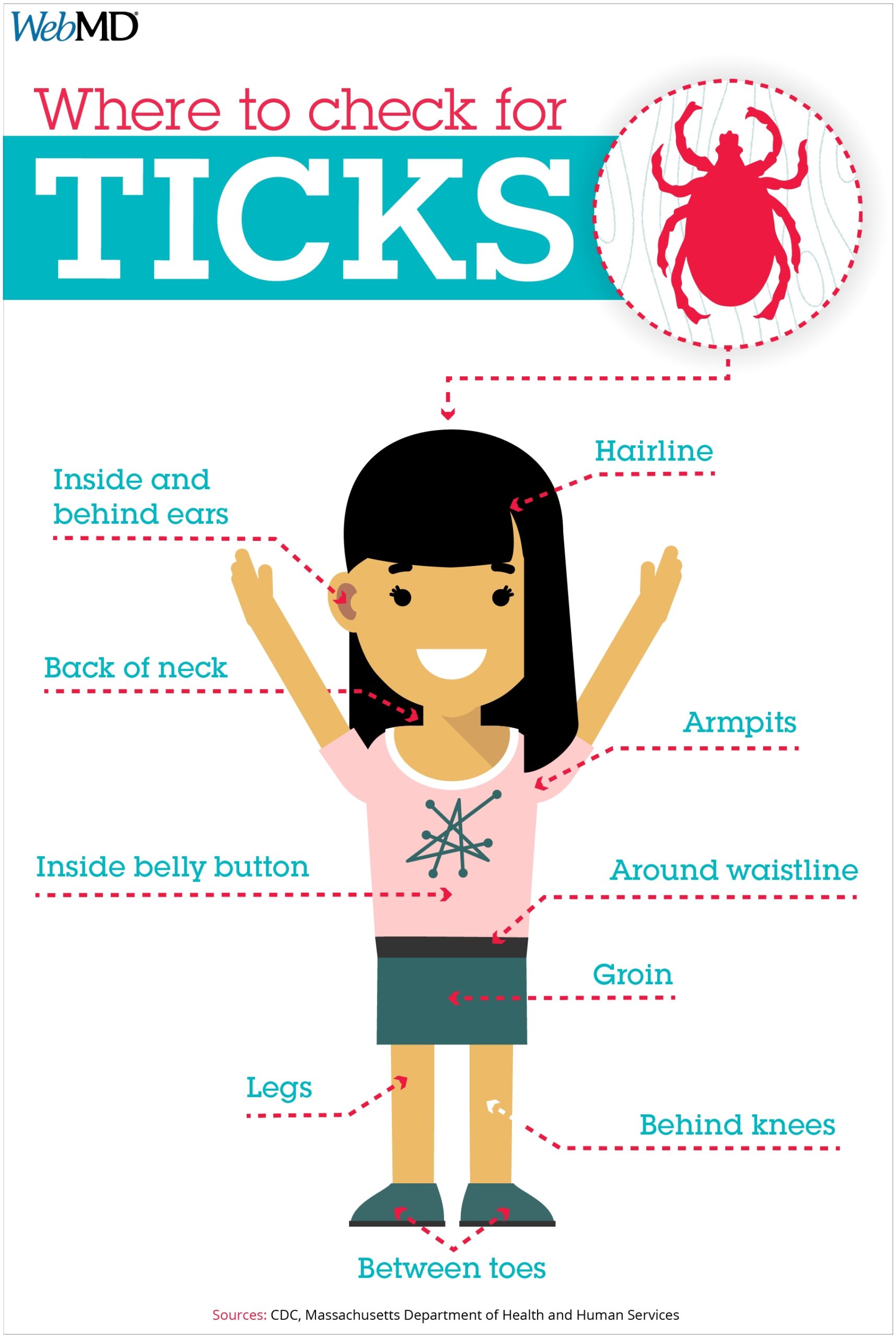Health & Safety Training
CHAIN OF COMMAND

Preventing Health Problems
- Accidents
- Consider the individual camper’s need
- Report any hazardous conditions
- Know how to use the equipment campers will be using
- Supervise all activities
- Make sure ALL your campers have been on the safety walk
- No medications are allowed in the cabins
- Insect stings or bites- bees, wasps, horseflies, spiders
- Nurse will notify counselor or their campers who are allergic to bites
- Prevention- empty cabin garbage at least daily
- If bit or stung accompany camper to the nurse to observe for serious reaction
- Do not use insect spray in the cabins
- Shoes must be worn when outdoors
- Discourage rough horseplay, especially in cabins
- No bunking of beds allowed
- Contagious Diseases
- Impetigo- open sores on the skin
- Lice-you might notice little white specks on hair
- Conjunctivitis- (Pink Eye)- eyes maybe swollen, itching, crusty
- Scabies- itching and scratching, open skin areas from scratching
- Colds- runny nose watery eyes, coughing, congestion, slight fever
- Severe sore throat- strep throat- white patches, fever; tonsillitis- severe pain in throat
- Prevention of contagious diseases
- Know the signs and symptoms
- Look for changes in camper’s behavior
- Bring to the nurse any camper exhibiting any of the above mentioned symptoms
- Do not let campers share personal items
- Do not let campers sleep together
- Encourage appropriate dress for the weather
- Encourage frequent, proper hand washing
- Encourage plenty of fluids
- Lyme Disease – caused by bacteria which is spread by the deer tick
- Lyme disease prevention
- Encourage appropriate clothing such as pants and light long sleeve shirt for hiking or fishing activities
- Spray shoes, socks, etc
- Read “Tips to trip up ticks” to all campers
- Perform a tick check when campers and staff return from walks in the woods
- Lyme disease prevention
- Signs and Symptoms
- Circular expanding rash
- Early symptoms may occur from a few days to 4 weeks after exposure
- After rash-nervous system involvement
- Meningitis
- Facial palsy
- Actions to take if you discover a tick bite
- take the person to the infirmary
- The nurse will remove the tick and follow procedures
- Rabies- avoid contact and close proximity to animals that normally do not appear in daytime.
- Treatment for animal bites- go to the infirmary and notify nurse immediately
- Measles- Report all rashes to nurse
AIDS- Use universal precautions
- Wear latex gloves to prevent contact with mucous membranes, blood or other bodily fluids
- Do not let children share toothbrushes, nail clippers, etc
- Remember to be tactful and loving in every situation.
- Rule of Thumb: TREAT ALL HUMAN BLOOD AND BODILY FLUIDS AS CONTAGIOUS.
Preventing and treating heat related illness
- Encourage children to drink plenty of fluids
- Try to keep them out of the sunlight
- On hot humid days less strenuous activities should be pursued.
Signs and Symptoms
- Heat exhaustion-Dizziness, confusion, fatigue, excessive thirst
- Heat cramps- muscular pain spasms
- Heat Stroke- this is an emergency notify nurse immediately. breathing is difficult, burning sensation in the chest and legs

HANDLING OF EMERGENCIES

- Have designated vehicles available- See Director
- Emergency medical care agreement – posted near phone in the kitchen, office, and infirmary.
- Staff and campers are instructed to report all injuries and signs and symptoms of illness to the nurse
EMERGENCY PROCEDURES
- Do not panic
- Begin first aid as necessary if trained
- Camp Director/Nurse will contact appropriate agencies
- Hospital
- Notify parents
- Keep campers and staff informed
- Health director will record the incident
- If you are not involved with the emergency continue with the program
- Ability to foresee danger-
- Common Sense- aware that certain situations can be potentially dangerous
- Faulty equipment
- Open pool gate
- Child not wearing shoes
- A hole in the ground
- Unusual relationship between a camper and staff member or a camper and camper.
- Common Sense- aware that certain situations can be potentially dangerous
- Observation
- Begins when you arrive-
- Become familiar with physical aspect of the camp
- Get to know and recognize other staff members
- Safety Walk (hazardous areas will be pointed out)
- When campers arrive-Spend time getting to know your campers
- Observe the way they walk, talk, posture, level of energy, attention span, glasses, braces. Will help detect spiritual or social needs of the camper
- See the nurse to find out if your camper has any health problems or special needs.
- Begins when you arrive-
- Carry through on observations
- Take care of the problem you’ve observed within your skill, training and responsibility.
- Report- preferably in writing, any other problems to the person in charge of that area or to the Director.
- Warn campers of dangerous behaviors, when necessary offer an alternative plan of activity. DO NOT simply walk away.
- All staff and specifically counselors bear the burden of supervising the campers 24 hours a day.
- Adequate supervision- a camper is protected from any risk to his/her health or safety including physical or sexual abuse or a public health hazard.
- Supervision involves- as a minimum- visual or verbal communication capabilities between camper and counselor. Counselors assigned to watch cabins in the morning should be awake and visible.
B1) CIT- a camper assigned to an on-duty counselor or other staff member to assist.
- At least one adult counselor must be present during sleeping hours
- Campers should not be in cabins alone at any time if possible.
- Leaving them alone endangers their safety and encourages fighting, stealing, and other discipline problems.
- They should not be in areas or buildings designated as hazardous.
- Accounting for the campers
- Counselors must account for their campers at all times.
- Have a roster of the campers under their care and know where they are supposed to be when not under your direct responsibility.
- Formal accounting of all campers 3x a day
- Line up with counselor before each meal
- Chapel service formal count- No one skips chapel
- Before lights out- director or program director goes to each cabin.
- Counselors must account for their campers at all times.
- Specialty counselors and staff teaching classes or special activities must have a roster of their campers and report any missing children immediately- Program Director.
- Helpful to regroup and meet in the cabin after activities in which the campers have been separated.
- Assigning buddies is also helpful.
- Any missing children must be reported to the director immediately.
- Lost camper plan might need to be implemented. Be familiar with the lost camper/swimmer plan
- Bell ringing repeatedly- everyone report to the blacktop
CHILD ABUSE
- What is Child Abuse?
-
- Any treatment of a child that threatens his safety or leaves in his life physical or emotional scars.
- Three Forms of Child Abuse
- Physical
- Emotional
- Sexual
- Each staff member is responsible to ensure safety
- Absolutely no verbal abuse
- Be careful with your words
- No degrading remarks
- No belittling words
- No discriminatory words or remarks
- Be careful with your words
- Discipline
- No physical punishment-
- No involuntary isolation in cabin or any other place
- No restraining unless it is with supervision
- Report discipline problems you can’t handle to the director
- Eating Patterns
- Do not retrain
- Do not force eating
- Notify nurse in case of a serious condition
- Sexual Abuse
- No sexual harassment or comments
- Careful with words
- No excessive hugging or kissing
- Avoid being totally alone with one camper.
- Give camper privacy w/o compromising supervision
- Avoid unnecessary remarks about child’s sexuality
- Do not share your social media with campers
- No sexual harassment or comments
